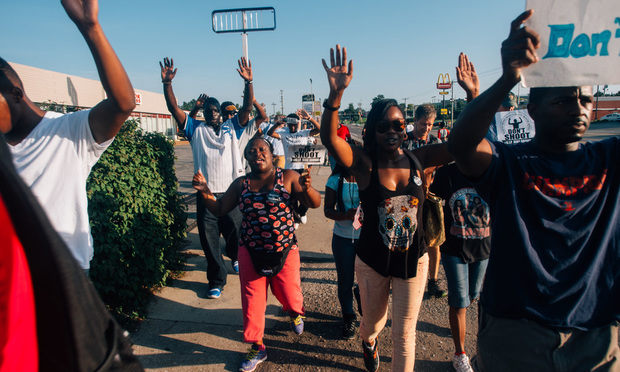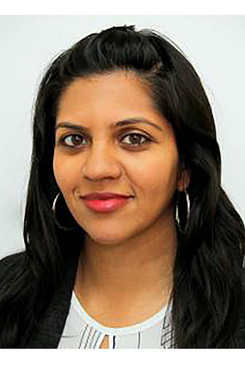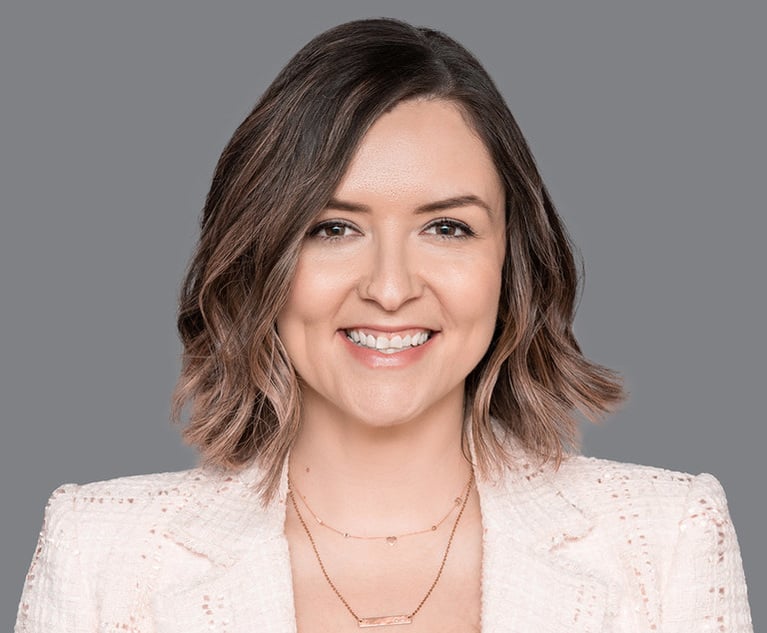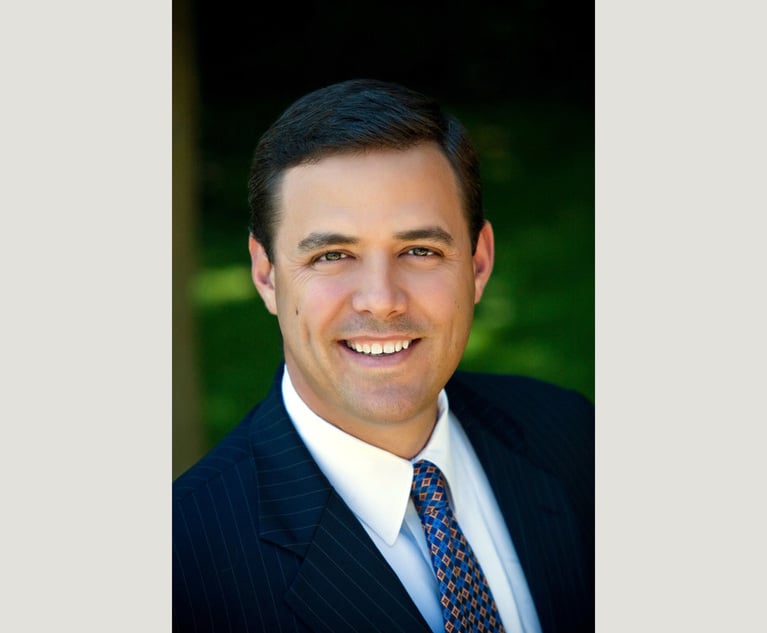Purvi Shah Is Perfecting the Art of 'Movement Lawyering'
The founder and executive director of Movement Law Lab has embarked on a journey to train and support lawyers and legal organizations dedicated to social justice.
November 29, 2018 at 09:49 AM
6 minute read
 Protesters march through Ferguson streets on Aug. 20, 2014. (Photo: Jamelle Bouie via Wikimedia Commons)
Protesters march through Ferguson streets on Aug. 20, 2014. (Photo: Jamelle Bouie via Wikimedia Commons)
Purvi Shah has a vision that law should serve society as a building block for equality and an architect for justice.
But the deep-rooted societal problems of racism and inequality surfacing in U.S. culture—including police shootings and sexual harassment—have made Shah see that lawyers must do more to realize her vision.
Shah, founder and executive director of Movement Law Lab, graduated from the University of California, Berkeley School of Law in 2006, the same year that she founded the Community
 Purvi Shah
Purvi ShahJustice Project of Florida Legal Services, representing taxi drivers, tenant unions and immigrants rights groups with civil rights and policy issues. By 2012, she was the founding director of the nation's first movement lawyering institute, the Bertha Justice Institute at the Center for Constitutional Rights in New York City. She's won an array of fellowships for her work, such as a Harvard Law School Wasserstein Fellowship and a Soros Equality Fellowship.
Shah, 37, has embarked on a journey to train and support lawyers and legal organizations dedicated to placing the full force and power of the law behind communities fighting for social justice. The idea, known as “movement lawyering,” is getting a boost from Shah's nonprofit, which funds and incubates projects by attorneys and legal organizations looking to make a difference.
Law.com spoke with Shah, a Baltimore resident whose parents are from India, about what movement lawyering is, its origins and connection to Black Lives Matter and what her incubator is doing to light the fire of change. Here are her answers, edited for brevity and clarity:
Some people may not have heard of “movement lawyering.” What does it mean?
Movement lawyering is an approach where law is used in collaboration with community organizing and social movements. With intentional collaboration and strategizing, lawyers can use our traditional tools—whether impact litigation or direct services or policy work—paired with grassroots organizing and social movements to lead to more systemic transformation.
What are the origins of movement lawyering?
It's existed for a very long time, not just in the United States. You can look at struggles for justice—like anti-colonial struggles, the struggle to free South Africa. Lawyers have always been a part, whether defending activists who were arrested or taking community demands and turning them into the Civil Rights Act. Historically, this approach to lawyering has been around. It's mostly been a hidden practice. It's not one that's risen to the surface; it's not one taught in law school. Movement lawyers have been practicing in spite of the traditional way we are taught the law. In this movement, movement lawyering is rising and surfacing more to the top.
How has movement lawyering become more prominent since the Black Lives Matter movement?
There's been a long-standing history of black communities that have been organizing against systemic racism. The history runs deep in America—the very foundation of the country was built on the enslavement of black people. If you look at the broader arc of a movement for black lives, the movement has been around a long time. Whether the movement to end slavery, the civil rights movement, the Black Power movement, and now the movement for black lives. In 2014, after Michael Brown was killed, there was an enormous and powerful response, a community lamenting the loss of one of its children. It sparked the conscience of our country. I was in Ferguson, Missouri, right after Michael Brown was killed. In these uprising movements there are immediate responses and roles for lawyers to play. The idea is to galvanize lawyers to play a role in the movement for black lives, moving forward, and to help create a vision for Black Lives Matter. The Ferguson crisis didn't come in a vacuum. It came from historical discrimination, lack of housing, gentrification, fees and fines and debtors' prisons.
Your organization, Movement Law Lab, is working to advance movement attorneys and legal organizations. What is your incubator doing?
The idea for Movement Law Lab came out of 10 years of looking at the field saying, “It's not enough to transform the way lawyers work. We need a new network of legal institutions that in their DNA have an approach that connects law to social movements and community organizing.” Fifty years ago, we saw the birth of a new generation of legal organizations like the ACLU and Center for Constitutional Rights and National Lawyers Guild. It came out of unrest in our country. Those organizations have been the front edge of civil rights. We are in a time in which we need a new generation of those organizations that are agile and able to respond in real time to things happening in our community. Our goal with the incubator is to launch those new generations of legal organizations.
Could you give me an example?
I'll talk about the Community Justice Project in Florida and the Detroit Justice Project. Both of these organizations are legal service providers in their cities. They do a vast range of legal work: impact litigation to direct services. They work on issues from mass incarceration to housing. Take an issue like displacement, tenants' rights and eviction. The predominant legal organization would take in individual tenants going through eviction, and they may represent them. It's certainly a valuable program. But organizations like Community Justice Project would do it differently. They'd say, “Where can they help build a tenant union?” In a union, they are trying to collectivize them in solving the problem. They may do the same legal work of individual representation, but, in addition, sit with the tenant group and ask if there's legislation that may help. It's looking at the bigger-picture problems and walking shoulder to shoulder with the community to try to find solutions instead of just managing the symptoms of the problem.
Looking forward—if this were a perfect world and you met all your objectives—what would that look like?
For me, what I'd see is black and brown communities, immigrant communities, working class communities in the U.S., where our communities are safe in the world. An honest day of work can lead to a sustainable living. Health care and jobs are plentiful, and children are being educated and not being incarcerated. It's about transforming systemic and violent and harmful systems we have in our society. In that world, there would be a web and constellation of legal organizations that are humbly practicing and working alongside the grass-roots organizations.
Angela Morris is a freelance journalist. Follow her on Twitter at @AMorrisReports.
This content has been archived. It is available through our partners, LexisNexis® and Bloomberg Law.
To view this content, please continue to their sites.
Not a Lexis Subscriber?
Subscribe Now
Not a Bloomberg Law Subscriber?
Subscribe Now
NOT FOR REPRINT
© 2025 ALM Global, LLC, All Rights Reserved. Request academic re-use from www.copyright.com. All other uses, submit a request to [email protected]. For more information visit Asset & Logo Licensing.
You Might Like
View All
Quiet Retirement Meets Resounding Win: Quinn Emanuel Name Partner Kathleen Sullivan's Vimeo Victory

How I Made Partner: 'Your Coworkers Are One of the Most Valuable Assets You Have,' Says Laurel Roglen of Ballard Spahr

Can a Law Firm Institutionalize Its Culture? Boies Schiller’s New Chairman Will Try

How I Made Office Managing Partner: 'Stay Focused on Building Strong Relationships,' Says Joseph Yaffe of Skadden
Trending Stories
Who Got The Work
J. Brugh Lower of Gibbons has entered an appearance for industrial equipment supplier Devco Corporation in a pending trademark infringement lawsuit. The suit, accusing the defendant of selling knock-off Graco products, was filed Dec. 18 in New Jersey District Court by Rivkin Radler on behalf of Graco Inc. and Graco Minnesota. The case, assigned to U.S. District Judge Zahid N. Quraishi, is 3:24-cv-11294, Graco Inc. et al v. Devco Corporation.
Who Got The Work
Rebecca Maller-Stein and Kent A. Yalowitz of Arnold & Porter Kaye Scholer have entered their appearances for Hanaco Venture Capital and its executives, Lior Prosor and David Frankel, in a pending securities lawsuit. The action, filed on Dec. 24 in New York Southern District Court by Zell, Aron & Co. on behalf of Goldeneye Advisors, accuses the defendants of negligently and fraudulently managing the plaintiff's $1 million investment. The case, assigned to U.S. District Judge Vernon S. Broderick, is 1:24-cv-09918, Goldeneye Advisors, LLC v. Hanaco Venture Capital, Ltd. et al.
Who Got The Work
Attorneys from A&O Shearman has stepped in as defense counsel for Toronto-Dominion Bank and other defendants in a pending securities class action. The suit, filed Dec. 11 in New York Southern District Court by Bleichmar Fonti & Auld, accuses the defendants of concealing the bank's 'pervasive' deficiencies in regards to its compliance with the Bank Secrecy Act and the quality of its anti-money laundering controls. The case, assigned to U.S. District Judge Arun Subramanian, is 1:24-cv-09445, Gonzalez v. The Toronto-Dominion Bank et al.
Who Got The Work
Crown Castle International, a Pennsylvania company providing shared communications infrastructure, has turned to Luke D. Wolf of Gordon Rees Scully Mansukhani to fend off a pending breach-of-contract lawsuit. The court action, filed Nov. 25 in Michigan Eastern District Court by Hooper Hathaway PC on behalf of The Town Residences LLC, accuses Crown Castle of failing to transfer approximately $30,000 in utility payments from T-Mobile in breach of a roof-top lease and assignment agreement. The case, assigned to U.S. District Judge Susan K. Declercq, is 2:24-cv-13131, The Town Residences LLC v. T-Mobile US, Inc. et al.
Who Got The Work
Wilfred P. Coronato and Daniel M. Schwartz of McCarter & English have stepped in as defense counsel to Electrolux Home Products Inc. in a pending product liability lawsuit. The court action, filed Nov. 26 in New York Eastern District Court by Poulos Lopiccolo PC and Nagel Rice LLP on behalf of David Stern, alleges that the defendant's refrigerators’ drawers and shelving repeatedly break and fall apart within months after purchase. The case, assigned to U.S. District Judge Joan M. Azrack, is 2:24-cv-08204, Stern v. Electrolux Home Products, Inc.
Featured Firms
Law Offices of Gary Martin Hays & Associates, P.C.
(470) 294-1674
Law Offices of Mark E. Salomone
(857) 444-6468
Smith & Hassler
(713) 739-1250








